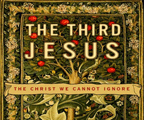 A recent book that’s appealing to a lot of post-moderns titled The Third Jesus: The Christ We Cannot Ignore by Indian-born doctor-turned-guru Deepak Chopra has got a lot of people seriously interested in thinking about Jesus–albeit in a different way. Definitely not in the way Jesus would want you to think about Him. This is a dangerous philosophy floating around with a lot of mumbo-jumbo sticking to it, much to the delight of unhappy Christians. Chopra, author of over 49 books on new-age subjects, portrays Jesus as a mystical person not the Savior of the world, certainly not an exclusive Savior. Jesus is not the only son of God, He is not the only way to heaven, He is not the exclusive God and the only God that orthodox or Biblical Christianity believes. To Chopra, Jesus would never offend homosexuals, or sinners. He simply accepts them. He is here to make us all experience God-Consciousness–a term confusing and bewildering that many despaired Christians find riveting due to its esoteric appeal. Sadly, many Christians who don’t understand the deceptions of Eastern philosophies like Yoga and New Age would easily shift their worldview to this new-age claptrap.
A recent book that’s appealing to a lot of post-moderns titled The Third Jesus: The Christ We Cannot Ignore by Indian-born doctor-turned-guru Deepak Chopra has got a lot of people seriously interested in thinking about Jesus–albeit in a different way. Definitely not in the way Jesus would want you to think about Him. This is a dangerous philosophy floating around with a lot of mumbo-jumbo sticking to it, much to the delight of unhappy Christians. Chopra, author of over 49 books on new-age subjects, portrays Jesus as a mystical person not the Savior of the world, certainly not an exclusive Savior. Jesus is not the only son of God, He is not the only way to heaven, He is not the exclusive God and the only God that orthodox or Biblical Christianity believes. To Chopra, Jesus would never offend homosexuals, or sinners. He simply accepts them. He is here to make us all experience God-Consciousness–a term confusing and bewildering that many despaired Christians find riveting due to its esoteric appeal. Sadly, many Christians who don’t understand the deceptions of Eastern philosophies like Yoga and New Age would easily shift their worldview to this new-age claptrap.In The Third Jesus, Chopra writes there is not one Jesus, but three. First, there is the historical Jesus, the man who lived more than two thousand years ago and whose teachings are the foundation of Christian theology and thought. Next there is Jesus the Son of God, who has come to embody an institutional religion with specific dogma, priesthood and devout believers. And finally, there is the third Jesus, the cosmic Christ, the spiritual guide whose teaching embraces all humanity, not just the Church built in His name. He speaks to the individual who wants to find God as a personal experience, to attain what some might call grace, or God-consciousness, or enlightenment.
Chopra is arguing for a syncretistic Christianity, a mix and match, a pot-luck faith where we all feast on different foods. The question is: how sure are we that we are not feasting on contaminated food, even worse food that can poison our soul?
This is classic postmodern inclusivism, a kind of Hegelian dialectic, which argues there is no right or wrong thesis but a synthesis of two opposing ideologies.
It’s the tragedy of western Christianity that in many churches and institutions Jesus has been deconstructed to become a laconic teacher, a pagan Christ, a Gnostic revealer, a de-enlightened male, a magician, a cynic philosopher. Put simply, He has been transmogrified. It’s a fascinating word that American Heritage dictionary says, “To change into a different shape or form, especially one that is fantastic or bizarre”.
Chopra is reducing Jesus to be another eastern mystic and not as the incarnation of God. Jesus is certainly eastern, precisely middle-eastern, but the geographical origin of His birth doesn’t reduce His deity. Jesus still remains who He is: the only incarnate God who lived on earth. The world’s calendar divides on His birth, AD and BC.
Chopra is teaching nothing more than pagan Eastern Mysticism which says that we are all “God”. “God” in Eastern Religions is all creation. It says that everything in creation, the rocks, the stars, the planets, bugs, fish, animals, human beings all inclusively make up this single holistic “God consciousness”. Eastern philosophies make no distinction between holiness and sinfulness. The idea that man is a fallen human being is considered to be an affront to human dignity. It accepts that mankind is inherently good and that we all can experience God within without ever having to place faith in Christ as our redeemer.
The essence of Chopra’s argument is that Christianity needs to overcome its tendency to be exclusionary and refocus on being a religion of personal insight and spiritual growth. In this way Jesus can be seen for the universal teacher he truly is–someone whose teachings of compassion, tolerance, and understanding can embrace and be embraced by all of us.
Reuben David
Leave a Comment: